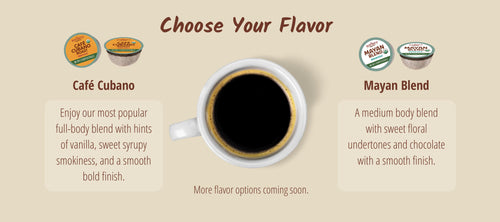







Our compostable coffee pods are more than 85% coffee grounds (real, actual coffee) with a paper lid, a coffee filter made from cornstarch, and a plant-based compostable ring made with coffee bean husks (that’s why they’re brown!). They might feel like fossil-fuel-based plastic, but they’re actually plant material that we’ve ground up and heated and formed to provide strength to the coffee pod, which then naturally degrades after use.
Yes! Our pods have been designed from the start to be composted in all types of municipal composting systems, both aerobic (oxygenated) and anaerobic (without oxygen). They were developed with a science-based approach to reducing single-use plastic and greenhouse gases in single-serve coffee.
Mayorga Organic’s coffee pods meet the internationally-established standard of 100% compostability as certified by the Biodegradable Products Institute (BPI). This is a US-based independent certification organization which ensures that any product they certify is fully compostable (all components) into good compost soil with no soil toxicity.
After composting, what do your compostable pods break down into? Our plant-based coffee pods were specifically designed to break down into the compost equivalent of food waste, like banana peels or corn cobs. In fact, our pods biodegrade faster in municipal composters than many food wastes like cherry pits, chicken bones, and corn cobs.
Many people put plant-based pods into their backyard compost. Since 85% of the pod is nitrogen-rich coffee grounds, even in a backyard composter coffee grounds are an excellent addition.
Unfortunately, there is no standardized certification for backyard composting yet, since every backyard composter is different: different temperatures, different moisture content, different bacteria, even different climate conditions can affect the compostability of any food waste (from banana peels to coffee pods).
So though we cannot certify our pods for backyard composting, many consumers have written to us with successful backyard compost stories, from climates north, south, east, and west.
Plant-based compostable pods are better at the beginning of life. They don’t use a fossil-fuel-based plastic cup, and instead use agricultural inputs (often agricultural waste inputs, like coffee bean skins, known as coffee chaff).
Plant-based compostable pods are better at time of use. They don’t need to be peeled and emptied and cleaned like “recyclable” plastic cups.
Multi-layer plastics such as “recyclable” plastic pods are difficult to recycle and are most often removed from the recycling stream, to be incinerated or go to landfill.Plant-based pods avoid any risks associated with drinking from plastic. Our plant-based compostable pods do not contain any of the polypropylene, vinyl compounds, or talc that can be found in multi-layer fossil fuel plastics.
Our pods are made with plant-based materials. The unique pod design includes a lid, ring and filter that are all Certified 100% Compostable in commercial composting facilities. In fact, our ring is made partially from recycled coffee chaff (the skins that come off the coffee beans during roasting).
Once you’re finished brewing your coffee, you can compost the entire pod, simply by placing it in the food waste container used in your community such as a green bin (check locally – where accepted). The pod will break down to healthy compost that can turn into rich-nutrient soil.
Once you’re finished brewing your coffee, you can compost the entire pod, simply by placing it in the food waste container used in your community such as a green bin (check locally – where accepted).
